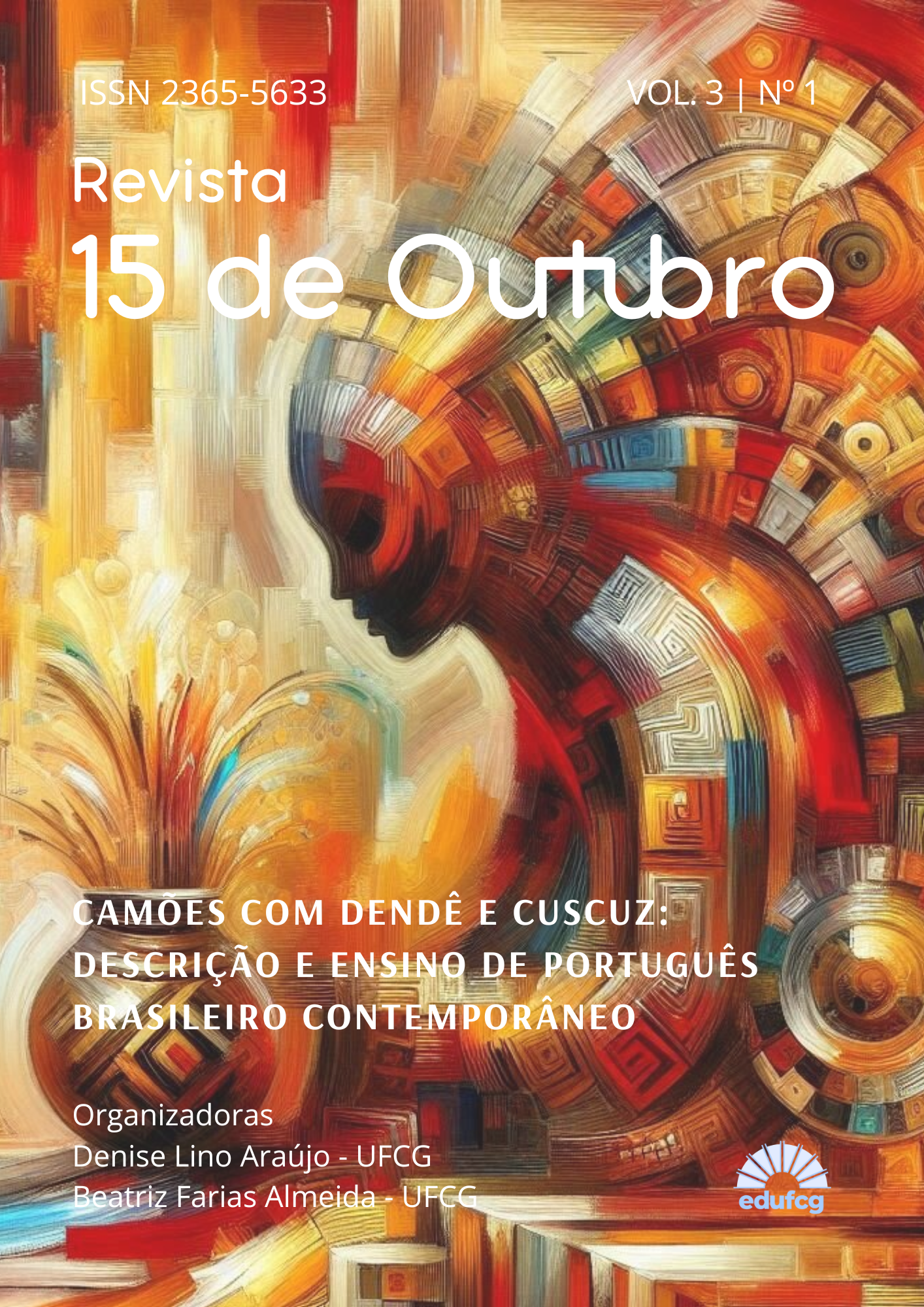VOCALISMO EM MEMES BRASILEIROS: CONTRASTE ENTRE A DESCRIÇÃO NORMATIVA E O USO
DOI:
https://doi.org/10.5281/zenodo.14057769Keywords:
Palavras-chave: Vocalismo. Ensino de Língua Portuguesa. Memes.Abstract
Abstract: The aim of this paper is to present the tendency of Brazilian Portuguese towards vocalization, based on its its occurrence in memes in contrast to the grammatical rule of standard Portuguese. We also take advantage of the study to suggest proposals for teaching activities on this phenomenon. We draw on Castro's (2022) studies on these Brazilian linguistic trends and on Bechara (1997) on the normative approach to this subject. This is a documentary study, carried out as part of the course entitled Studies of Spoken Portuguese 2023.2. Of this study is made up of 5 memes, 4 of which were collected on Twitter and 1 on Facebook. The results indicated the addition of the vowel i, altering the original spelling of the words in the memes through the elimination of consonant clusters (tm, pn, bs, bj, ps), typically illustrating the speech of Brazilian Brazilians who oppose grammatical normativity. As far as the activities are concerned, we concluded that they all teaching the phenomenon through the meme genre, leading the student to reflect that there is a historical that there is a historical explanation for this use, so it must be observed in its particularities in order todeconstruct the mistaken notion of “error”.
Keywords: Vocalism. Portuguese language teaching. Memes.
Downloads
References
ANDERSON. x.com. 18 de jul. de 2024. Disponível em: https://x.com/Anderson228975/status/1813934100799181055/photo/1. Acesso em: 20 de jul. 2024.
BECHARA, Evanildo. Moderna Gramática Portuguesa: cursos de 1º e 2º grau. 36. ed. São Paulo: Companhia Editora Nacional, 1997.
BRASIL. Ministério da Educação. Base Nacional Comum Curricular. Brasília: MEC, 2018. Disponível em: http://basenacionalcomum.mec.gov.br/images/BNCC_EI_EF_110518_versaofinal_site.pdf. Acesso em: 01 de jun. de 2023.
CASTRO, Yeda Pessoa de. O Português do Brasil: ancianidade com africania. In: CASTRO, Yeda Pessoa de. Camões com dendê: o português do brasil e os falares afro-brasileiros. Rio de Janeiro: Topbooks, 2022. p. 234-277.
COUTO, Hildo Honório do. O que é português brasileiro. 3.ed. São Paulo: Brasiliense, 1987.
GALVÃO, Fernando. x.com. 15 jul. 2024. Disponível em: https://x.com/FernandoGalvao5/status/1812954392527839463/photo/1. Acesso em: 18 de jul. de 2024.
LUCCHESI, Dante. As duas grandes vertentes da história sociolingüística do Brasil (1500-2000). DELTA: Documentação de Estudos em Lingüística Teórica e Aplicada, v. 17, n. 1, p. 97–130, 2001.
MARQUES, Céu. Correção: Favor não deixar objetos no corredor.13.agosto de 2011. Facebook: Língua Portuguesa. Disponível em: https://www.facebook.com/linguaportuguesa07/photos/a.272563609424284/1081111215236182/?type=3&locale=pt_BR. Acesso em: 05 de maio de 2024.
MEME, Bode Gaiato. Museu de memes, 2013. Disponível em: https://museudememes.com.br/collection/bode-gaiato. Acesso em 05 de maio de 2024.
SILVA, Larissa. x.com. 16 de jul. de 2024. Disponível em: https://x.com/larri58019/status/1813187098012168542/photo/1. Acesso em: 18 de jul. de 2024.
SILVA, Larissa. x.com. 16 jul. 2024. Disponível em: https://x.com/larri58019/status/1813181218713723285/photo/1. Acesso em: 18 de jul. de 2024.
VAZ, Camila. Você sabe realmente por que a pronúncia ADEVOGADO é ridicularizada?. Jusbrasil, 2016. Disponível em: https://www.jusbrasil.com.br/artigos/voce-sabe-realmente-por-que-a-pronuncia-adevogado-e-ridicularizada/332231631. Acesso em: 05 de maio de 2024.
Downloads
Published
How to Cite
Issue
Section
License
Copyright (c) 2024 Revista 15 de outubro

This work is licensed under a Creative Commons Attribution-NonCommercial-NoDerivatives 4.0 International License.

